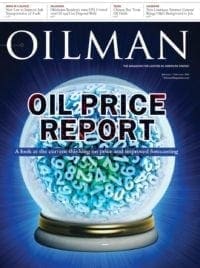Lifting the current export ban on crude oil in the U.S. and allowing for free trade of all hydrocarbons could provide an opportunity for Louisiana to grow as the center of an emerging global trading hub, according to a new report from the Louisiana State University Center for Energy Studies (LSU-CES)
In the Nov. 30 study “Crude Oil Exports and the Louisiana Economy,” LSU-CES Assistant Professor Gregory Upton said that lifting the export ban could, for example, spur investment in the expansion of the Louisiana Offshore Oil Port (LOOP) to allow for both imports and exports of crude. That expansion, he said, would create a dynamic two-way trading hub that has the potential to shift the world oil market’s focus from Brent to the Louisiana Gulf Coast.
“Current investments in liquefied natural gas (LNG) could set the Gulf Coast at the epicenter for a new global market for natural gas – that has historically been traded regionally (not globally),” he said. “Trade liberalization for all hydrocarbons can enhance the Gulf Coast’s ability to be a global hub for oil and gas commerce.”
Grossly Overstate Assumptions
Upton said that, based on his research, it appears that both the benefits and concerns expressed by proponents and opponents of lifting the export ban “are likely grossly overstated.”
“Proponents have argued that the removal of the export ban will create large increases in domestic production and hundreds of thousands of domestic jobs … while opponents have argued that the repeal of the law will significantly increase oil and gas production thus exacerbating global CO2 emissions and climate change,” he said.
According to Upton, the supposed costs and benefits of lifting the export ban are “highly speculative” and based on a number of “overarching assumptions about the future.”
Upton claimed that the current debate over removing the ban should focus on whether the ban has been successful in achieving national security objectives and whether it is expected to achieve national security objectives in the future.
“For Louisiana, the removal of the export ban will remove a long run federal protectionist policy on an industry that has served as an important component of our economy, but in return will have the opportunity for the state to be at the center of an emerging global trading hub,”
he said.
A New Role for Loop
According to the study, lifting the ban on exports would allow LOOP to expand its operations and become an export terminal for the new supply of domestic crude oil created by the shale boom.
Expansion of LOOP to an import and export center would be a boon for the Gulf Coast economy.
Upton said that an increase in the amount of crude moving through LOOP would likely be accompanied by increases in storage capacity and potentially even pipeline capacity to move the crude along the Gulf Coast, either towards LOOP for export or away from LOOP for import. In addition, the creation of a dynamic trading platform for crude in the Gulf of Mexico has the potential to give the refining and petrochemical industries the advantage of having access to an almost unlimited mix of crudes on relatively short notice.
“Potentially, the refining industry could trade its decades old protectionist policies for a chance at truly becoming the world epicenter for hydrocarbon commerce,” he said.












